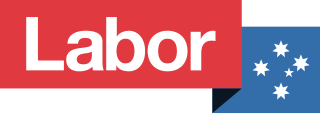
The Australian Labor Party (ALP), also known simply as Labor or the Labor Party, is the major centre-left political party in Australia and one of two major parties in Australian politics, along with the centre-right Liberal Party of Australia. The party has been in government since the 2022 federal election, and with political branches active in all the Australian states and territories, they currently hold government in New South Wales, South Australia, Victoria, Western Australia, and the Australian Capital Territory. As of 2024, Queensland, Tasmania and Northern Territory are the only states or territories where Labor currently forms the opposition. It is the oldest continuous political party in Australian history, having been established on 8 May 1901 at Parliament House, Melbourne; the meeting place of the first Federal Parliament.
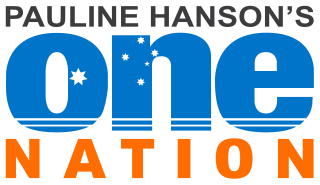
Pauline Hanson's One Nation, also known as One Nation or One Nation Party, is a right-wing populist political party in Australia. It is led by Pauline Hanson.

Andrew John Julian Bartlett is an Australian politician, social worker, academic, and social campaigner who served as a Senator for Queensland from 1997 to 2008 and from 2017 to 2018. He represented the Australian Democrats in his first stint in the Senate, including as party leader from 2002 to 2004 and deputy leader from 2004 to 2008. In November 2017, he returned to the Senate as a member of the Australian Greens, replacing Larissa Waters after her disqualification during the parliamentary eligibility crisis. He resigned from the Senate in August 2018 in an unsuccessful attempt to win the House of Representatives seat of Brisbane, allowing Waters to fill his seat in advance of the 2019 election.
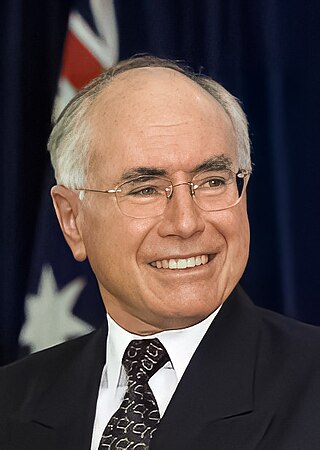
The 2001 Australian federal election was held in Australia on 10 November 2001. All 150 seats in the House of Representatives and 40 seats in the 76-member Senate were up for election. The incumbent Liberal Party of Australia led by Prime Minister of Australia John Howard and coalition partner the National Party of Australia led by John Anderson defeated the opposition Australian Labor Party led by Kim Beazley. As of 2024, this was the most recent election to feature a rematch of both major party leaders. Future Opposition Leader Peter Dutton entered parliament at this election.

The 2004 Australian federal election was held in Australia on 9 October 2004. All 150 seats in the House of Representatives and 40 seats in the 76-member Senate were up for election. The incumbent Liberal Party of Australia led by Prime Minister of Australia John Howard and coalition partner the National Party of Australia led by John Anderson defeated the opposition Australian Labor Party led by Mark Latham.

The Shooters, Fishers and Farmers Party (SFF) is a conservative Australian political party. It primarily advocates for increased funding and services for rural and regional Australia, protecting the right to farm, enhancing commercial and recreational fishing, and relaxing gun control for citizens.
The Division of Kooyong is an Australian Electoral Division for the Australian House of Representatives in the state of Victoria, which covers an area of approximately 59 km2 (23 sq mi) in the inner-east of Melbourne. It contains the affluent suburbs of Balwyn, Balwyn North, Camberwell, Canterbury, Deepdene, Kew, Kew East, Mont Albert, Mont Albert North, Surrey Hills and parts of Glen Iris.

The Division of Page is an Australian electoral division in the state of New South Wales.
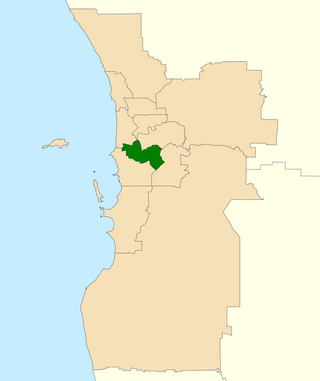
The Division of Tangney is an Australian electoral division in the state of Western Australia. The Division was named after Dame Dorothy Tangney, the first female member of the Australian Senate.

Christopher "Chris" Peter Hartcher is an Australian politician. He was a member of the New South Wales Legislative Assembly from 1988 to 2015, representing the electorates of Gosford (1988–2007) and Terrigal (2007–2015). He represented the Liberal Party for most of his career, serving as its deputy state leader from 2002 to 2003, and in the O'Farrell Ministry as Minister for Resources and Energy, Special Minister of State and Minister for the Central Coast. In 2013, he resigned to sit as an independent following his implication in an ongoing Independent Commission Against Corruption inquiry, and retired at the 2015 state election.

The New South Wales Labor Party, officially known as the Australian Labor Party and commonly referred to simply as NSW Labor, is the New South Wales branch of the Australian Labor Party (ALP). The branch is the current ruling party in the state of New South Wales and is led by Chris Minns, who has served concurrently as premier of New South Wales since 2023.
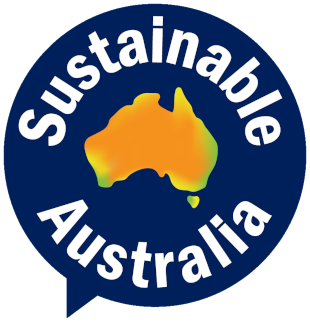
The Sustainable Australia Party (SAP), officially registered as Sustainable Australia Party – Universal Basic Income, is an Australian political party that was formed in 2010.

The United Australia Party (UAP), formerly known as Clive Palmer's United Australia Party and the Palmer United Party (PUP), is an Australian political party formed by mining magnate Clive Palmer in April 2013. The party was deregistered by the Australian Electoral Commission in 2017, revived and re-registered in 2018, and voluntarily deregistered in 2022. The party fielded candidates in all 150 House of Representatives seats at the 2013 federal election. Palmer, the party's leader, was elected to the Division of Fairfax and it reached a peak of three senators following the rerun of the Western Australian senate election in 2014. When the party was revived under its original name in 2018, it was represented by ex-One Nation senator Brian Burston in the federal parliament.

The 2018 South Australian state election to elect members to the 54th Parliament of South Australia was held on 17 March 2018. All 47 seats in the House of Assembly or lower house, whose members were elected at the 2014 election, and 11 of 22 seats in the Legislative Council or upper house, last filled at the 2010 election, were contested. The record-16-year-incumbent Australian Labor Party (SA) government led by Premier Jay Weatherill was seeking a fifth four-year term, but was defeated by the opposition Liberal Party of Australia (SA), led by Opposition Leader Steven Marshall. Nick Xenophon's new SA Best party unsuccessfully sought to obtain the balance of power.
Centre Alliance (CA), formerly known as the Nick Xenophon Team (NXT), is a centrist Australian political party based in the state of South Australia. It currently has one elected representative, Rebekha Sharkie in the House of Representatives.

Yellow Vest Australia (YVA), until 9 April 2019 known as the Australian Liberty Alliance (ALA), was a minor right-wing to far-right political party in Australia. The party was founded by members of the Q Society and has been described as the political wing of Q Society. The leader was Debbie Robinson (President), who was also national president of the Q Society. On 4 September 2020, the Australian Electoral Commission removed the Yellow Vest Australia from the registered political party list.

The 2022 South Australian state election was held on 19 March 2022 to elect members to the 55th Parliament of South Australia. All 47 seats in the House of Assembly, and half the seats in the Legislative Council were up for re-election.

The 2022 Australian federal election was held on Saturday 21 May 2022 to elect members of the 47th Parliament of Australia. The incumbent Liberal/National Coalition government, led by Prime Minister Scott Morrison, sought to win a fourth consecutive term in office but was defeated by the opposition Labor Party, led by Anthony Albanese. Up for election were all 151 seats in the lower house, the House of Representatives, as well as 40 of the 76 seats in the upper house, the Senate.















